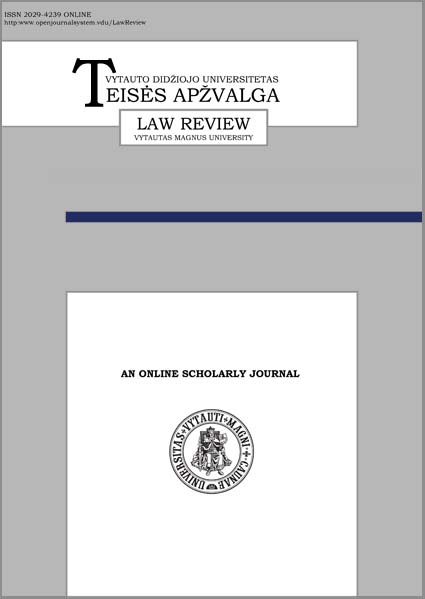Lenkijos teisėsaugos ir teismų veikla kovojant su prekių padirbinėjimu
Practices of Polish Law Enforcement and the Judiciary in Terms of Fighting Counterfeiting of Gods
Author(s): Natalia DaśkoSubject(s): Law, Constitution, Jurisprudence, Criminal Law, Criminology
Published by: Vytauto Didžiojo Universitetas
Keywords: Counterfeiting of goods; Counterfeiting of medicinal products; Money laundering; Corruption; Human trafficking; Smuggling; Organized crime; Trade; Fakes; Counterfeits; Counterfeiters; Criminal law;
Summary/Abstract: The phenomenon of product counterfeiting, including especially medicinal products, has been on increase, not only contributing to growing losses of the right- holders, but primarily constituting an increasing threat to consumers and safety of the country.Counterfeiting significantly reduces the revenue from taxes and fees; there are more and more reports about the fatal consequences of the use of counterfeited goods, especially drugs, dietary supplements, mechanical and electronic devices. The dynamic character of the phenomenon of product counterfeiting is reflected not only in the continuing increase in the amount of counterfeited products on the market and the diversification of the categories of the counterfeited products, which results in a situation where all the products available in the economic trade have their counterfeited equivalents, but also in new trends in the fields of manufacture and distribution. Furthermore goods counterfeiting is related to the growth of crime by engaging organized crime and its connection with other serious crimes, including money laundering, human trafficking and enabling illegal immigration, frauds, and terrorism.In Poland the significance and seriousness of the problem of goods and medicinal products counterfeiting, as well as legal penal instruments to prevent it, are not sufficiently recognized by the legislation or the practice. Goods counterfeiting remains beyond the control of the law enforcement, its prevention remains a façade, and the undertaken actions are conducted ad hoc, without a well-thought wider plan.Article is based on the Author’s doctoral thesis (“Criminal protection of trademarks”, Toruń 2015, unpublished, written under the academic supervision of Professor Andrzej Adamski), which was dedicated to the analysis of the phenomenon of goods counterfeiting from the criminological and legal perspective (regulations regarding the criminal protection of trademarks in the international, EU, British, German, French, Italian, and Polish law were the subjects of the research). An important part of the thesis was the empirical research connected to the practice of Polish law enforcement and the judiciary in terms of cases tried under Article 305 of the act on Industrial Property Law legally closed between 2007 and 2014. It included statistical research, case records studies, and individual in-depth interviews with police officers, customs officers, and prosecutors. The conducted case records studies regarded cases from the District Court in Piaseczno (however vital its role is), while the individual in-depth interviews encompasses officers from two police units (Departments for Fighting Economic Crime of the Metropolitan Police Authority and the County Police in Piaseczno), one unit of Customs Service (Department for Fighting Crime), and a prosecutor from one Prosecutor’s Office (District Public Prosecutor's Office in Piaseczno). Produktų, ypač vaistinių produktų, klastojimo fenomeno mastai vis didėja, turint omenyje ne tik augančius teisėtų savininkų nuostolius, bet pirmiausia vis augančią grėsmę vartotojų ir šalies saugumui. Šis klastojimas reikšmingai sumažina biudžeto pajamas, gaunamas iš mokesčių bei rinkliavų; taipogi yra daugybė pranešimų apie mirtinas pasekmes, kurias sukėlė suklastotų prekių naudojimas ar vartojimas: ypač vartojant suklastotus vaistus, dietinius papildus, naudojant mechaninius ir elektroninius prietaisus. Šis fenomenas pasireiškia ne tik ekonominėje rinkoje, kuomet kone visi prieinami produktai turi savo lygiavertes klastotes, bet ir pramonėje bei platinimo procese. Be to, prekių klastojimas yra susijęs ir su organizuoto nusikalstamumo veikimu šioje srityje ir apima daug susijusių nusikaltimų, tokių kaip pinigų plovimas, prekyba žmonėmis, nelegali imigracija, sukčiavimas ir terorizmas.Lenkijoje prekių ir vaistinių produktų klastojimo problemos reikšmė ir rimtumas, dar nėra pakankamai pripažinti teisėkūroje ar praktikoje, baudžiamieji instrumentai skirti kovai su šia problema atitinkamai nėra pakankami.. Prekių klastojimas lieka už įstatymo ribų, prevencijos klausimas taip pat nėra išspręstas, o atliekami veiksmai yra ad hoc be jokio gerai apgalvoto plano.
Journal: Teisės apžvalga
- Issue Year: 2017
- Issue No: 2(16)
- Page Range: 143-156
- Page Count: 14
- Language: English

